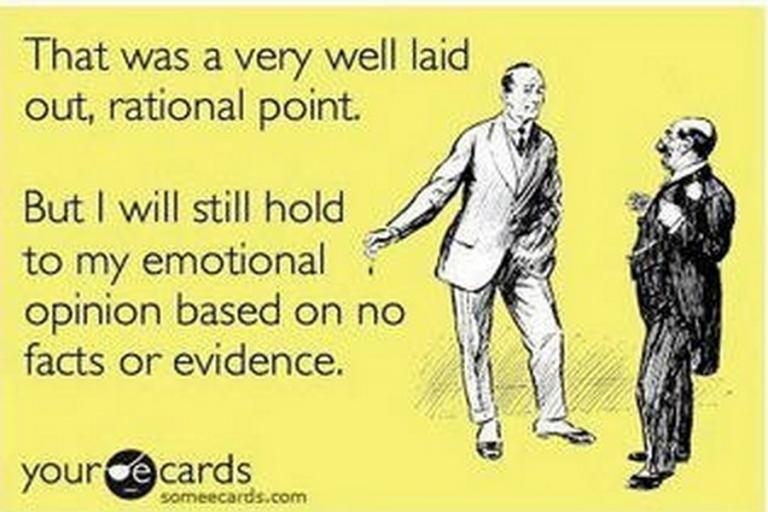So imagine you are driving on autopilot, as we all do much of the time. Suddenly the car in front of you cuts you off quite unexpectedly. You slam your brakes and feel scared and indignant. Maybe you flash your lights or honk your horn at the other car. What’s your gut feeling about the other driver? I know my first reaction is that the driver is rude and obnoxious.
Now imagine a different situation. You’re driving on autopilot, minding your own business, and you suddenly realize you need to turn right at the next intersection. You quickly switch lanes and suddenly hear someone behind you honking their horn. You now realize that there was someone in your blind spot and you forgot to check it in the rush to switch lanes. So you cut them off pretty badly. Do you feel that you are a rude driver? The vast majority of us do not. After all, we did not deliberately cut that car off, we just failed to see the driver. Or let’s imagine another situation: say your friend hurt herself and you are rushing her to the emergency room. You are driving aggressively, cutting in front of others. Are you a rude driver? Not generally. You’re merely doing the right thing for the situation.
So why do we give ourselves a pass, while attributing an obnoxious status to others? Why does our gut always make us out to be the good guys, and other people bad guys? Clearly, there is a disconnect between our gut reaction and reality here. It turns out that this pattern is not a coincidence. Basically, our immediate gut reaction attributes the behavior of others to their personality and not to the situation in which the behavior occurs. The scientific name for this type of error in thinking and feeling is called the fundamental attribution error, also called the correspondence bias. So if we see someone behaving rudely, we immediately and intuitively feel that this person IS rude. We don’t automatically stop to consider whether an unusual situation may cause someone to act this way. With the driver example, maybe the person who cut you off did not see you. Or maybe they were driving their friend to the emergency room. But that’s not what our automatic reaction tells us. On the other hand, we attribute our own behavior to the situation, and not our personality. Much of the time, we feel like we have valid explanations for our actions.
Learning about the fundamental attribution error helped me quite a bit. I became less judgmental about others, including religious people. I realized that the people around me were not nearly as bad as my gut feelings immediately and intuitively assumed. This decreased my stress levels, and I gained more peace and calm. Moreover, I realized that my intuitive self-evaluation is excessively positive and that in reality I am not quite the good guy as my gut reaction tells me. Additionally, I realized that those around me who are unaware of this thinking and feeling error, are more judgmental of me than my intuition suggested. So I am striving to be more mindful and thoughtful about the impression I make on others.
The fundamental attribution error is one of many problems in our natural thinking and feeling patterns. It is certainly very helpful to learn about all of these errors, but it’s hard to focus on avoiding all of them in our daily life. A more effective strategy for evaluating reality more intentionally to have more clarity and thus gain greater agency is known as “map and territory.” This strategy involves recognizing the difference between the mental map of the world that we have in our heads and the reality of the actual world as it exists – the territory.
For myself, internalizing this concept has not been easy. It’s been painful to realize that my understanding of the world is by definition never perfect, as my map will never match the territory. At the same time, this realization was strangely freeing. It made me recognize that no one is perfect, and that I do not have to strive for perfection in my view of the world. Instead, what would most benefit me is to try to refine my map to make it more accurate. This more intentional approach made me more willing to admit to myself that though I intuitively and emotionally feel something is right, I may be mistaken. At the same time, the concept of map and territory makes me really optimistic, because it provides a constant opportunity to learn and improve my assessment of the situation. Others to whom I taught this concept in videotaped workshops for Intentional Insights also benefitted from learning about both the fundamental attribution error and the idea of map and territory. One workshop participant wrote in an anonymous feedback form: “with relation to the fundamental attribution error, it can give me a chance to keep a more open mind, which will help me to relate to others more, and view a different view of the “map” in my head.”
So what do you think of the concept of map and territory? How do you think they can help you in your life?
















